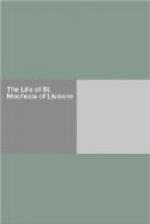Mochuda refused for a long while, as we have already said, to accept cattle or horses from anyone; it was the monks themselves who dug and cultivated the land and they did all the haulage of the monastery on their own backs. St. Fionan however who was a kinsman of Mochuda and had just returned from Rome, came at this time on a visit to the monastery. He reproached Mochuda saying: “Mochuda, why do you impose the burden of brute beasts upon rational beings? Is it not for use of the latter that all other animals have been created? Of a truth I shall not taste food in this house till you have remedied this grievance.” Thenceforth Mochuda—in honour of Fionan—permitted his monks to accept horses and oxen from the people and he freed them from the hardship alluded to. Sometime later the holy abbot, Lachtaoin [St. Lachten], compassionating Mochuda and his monks because of their lack of cattle paid a visit to Rahen bringing with him a gift of thirty cows and a bull, also a couple of cattlemen and two dairymaids. Coming near Rahen he left the cattle in a secluded place, for he did not wish them to be seen. Thereupon he went himself to the monastery and simulating illness requested a drink of milk. The house steward went to Mochuda to tell him that Lachtaoin was ill and required milk. Mochuda ordered the steward to fill a pitcher with water and bring it to him—and this order was executed. Mochuda blessed the water which immediately was changed into sweet new milk apparently of that day’s milking. He sent the milk to Lachtaoin but the latter identified it as milk miraculously produced; he in turn blessed it with the result that it was changed back again into water. He complained:—“It is not water but milk I have asked for.” The messenger related this fact publicly. Lachtaoin declared:— “Mochuda is a good monk but his successors will not be able to change water to milk,” and to the messenger he said—“Go to Mochuda and tell him that I shall not break bread in this house until he accept the alms which I have brought to the community.” On Mochuda agreeing to accept them he handed over the cattle and dairymen to the monks of Rahen and the stewards took charge of them. Mochuda said thereupon, that he should not have accepted the cattle but as a compliment to Lachtaoin. Lachtaoin replied:—“From this day forward there will be plenty cattle and worldly substance in your dwelling-place and there will be a multitude of holy people in the other place whence you are to depart to heaven (for you will be exiled from your present home).” After they had mutually blessed and taken leave and pledged friendship Lachtaoin departed.
Once, at harvest time, the farm steward came to Mochuda complaining that, though the crop was dead ripe, a sufficient number of harvesters could not be found. Mochuda answered: “Go in peace, dear brother, and God will send you satisfactory reapers.” This promise was fulfilled, for a band of angels came to the ripest and largest fields, reaped and bound a great deal quickly, and gathered the crop into one place. The monks marvelled, though they knew it was God’s work and they praised and thanked Him and Mochuda.




